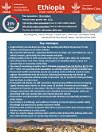Resilient Cities urban nutrition profile: Ghana
Margolies, Amy · Amunga, Dorcas · Craig, Hope · Folson, Gloria · Olney, Deanna K.
Mar 2025 · Intl Food Policy Res Inst
Ebook
22
Pages
family_home
Eligible
info
reportRatings and reviews aren’t verified Learn More
About this ebook
Ghana’s urban population has grown significantly, and while undernutrition in children has decreased, urbanization and economic progress have led to a shift toward overnutrition. The rise in consumption of poor-quality diets and ultra-processed foods (UPFs), along with more sedentary lifestyles, is contributing to alarming increases in overweight and obesity and diet-related noncommunicable diseases (NCDs) such as hypertension and diabetes. The country is facing an emerging double burden of malnutrition (DBM), in which undernutrition coexists with overnutrition. The prevalence of child stunting is declining in rural areas, but child overweight and obesity is rising in urban areas. Increasing rates of overweight and obesity are also concerning among urban women and adolescent girls. Micronutrient deficiencies affect both urban and rural populations. Ghanaians in urban areas have more diverse diets but higher consumption of unhealthy foods, while those in rural areas face food insecurity and nutrient inadequacies. These challenges highlight the need for targeted dietary interventions to address poor feeding practices, healthy diets, and micronutrient deficiencies. Diet-related NCDs, such as hypertension and diabetes, are rising alongside contributing dietary risk factors, with urban areas and women most affected. Urban youth face higher NCD risks, with low diagnosis rates and socioeconomic factors exacerbating urban-rural disparities. Urban nutrition interventions improved child growth, reduced blood pressure in hypertensive adults, increased nutrition knowledge in schoolchildren. However, some strategies had limitations, and urban programs overlook poor diet quality, failing to address the need for double-duty interventions to tackle the double burden of malnutrition (DBM). Nutrition policies, guided by the Scaling Up Nutrition movement, address food security and healthy diets by targeting vulnerable groups such as young children, women, and adolescents. Ghana has made progress in promoting nutrition and healthy diets through multisectoral advocacy efforts, including the implementation of sugar-sweetened beverage (SSB) taxes, social protection programs, and a national NCD policy. However, challenges remain, as few policies directly address the urban poor, and insufficient funding, weak governance, unhealthy urban food environments, food safety issues, and the unaffordability of healthy diets require targeted efforts to improve diets and address multiple forms of malnutrition, particularly in urban and peri-urban areas. Strengthening coordination and focusing on obesity and NCD prevention in urban areas are urgent priorities. Double-duty interventions and programs in social protection, agriculture, health, and education should be designed, implemented, and evaluated to tackle all forms of malnutrition.
Rate this ebook
Tell us what you think.
Reading information
Smartphones and tablets
Install the Google Play Books app for Android and iPad/iPhone. It syncs automatically with your account and allows you to read online or offline wherever you are.
Laptops and computers
You can listen to audiobooks purchased on Google Play using your computer's web browser.
eReaders and other devices
To read on e-ink devices like Kobo eReaders, you'll need to download a file and transfer it to your device. Follow the detailed Help Center instructions to transfer the files to supported eReaders.







